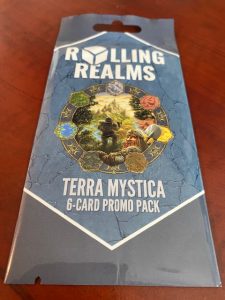 A few weeks ago, an ice cream sandwich pop-up in St. Louis called Sugarwitch mentioned on Instagram that they were partnering with an amazing local bakery (Whisk) for the weekend on a poptartlet/ice cream combo. It looked amazing.
A few weeks ago, an ice cream sandwich pop-up in St. Louis called Sugarwitch mentioned on Instagram that they were partnering with an amazing local bakery (Whisk) for the weekend on a poptartlet/ice cream combo. It looked amazing.
I’ve seen “collabs” like this all over St. Louis. Two restaurants combine distinctive dishes to form something new, with both benefiting from the signal boost, the corresponding revenue, and the goodwill. There’s something nice about seeing two great companies work together.
I thought of these collabs recently when a fellow tabletop publisher–a company I hold in high esteem in terms of their people, products, and values–reached out to Stonemaier Games about a potential collaboration for a specific product based on one of our brands.
 That specific opportunity is an ongoing conversation that I’ll share in the future if it bears fruit. Today I thought I’d share my perspective on what I view as the different levels of publisher-level collaboration (from slight to full):
That specific opportunity is an ongoing conversation that I’ll share in the future if it bears fruit. Today I thought I’d share my perspective on what I view as the different levels of publisher-level collaboration (from slight to full):
- Crossover Promos: You’ve probably seen these on Kickstarter, and perhaps you’ve heard that Stonemaier Games is making promo realms for our game Rolling Realms. In fact, we’ll start selling the Terra Mystica realm packs on our webstore on November 19. The way I’ve structured it is that I pay a 1-time fee to the publisher for the right to make a realm based on one of their games and for their initial concept for the realm (I send them a copy of Rolling Realms for context). We have quite a few of these in the works, and my hope is that it will be good for both games.
- Licenses: Licensing a brand or IP is very common. We’ve done it for Red Rising, Scythe, and Between Two Castles of Mad King Ludwig, and Overworld Games did it for Leaders of Euphoria. My feelings about licenses are somewhat mixed, as I discuss in detail in this article. I just think it’s pretty rare for a license to be worth the ongoing royalty cost.
- Design Studios: There are some small publishers that realize they really just want to focus on the creative process, not on all of the other aspects of business (sales, marketing, customer service, logistics, fulfillment, etc). In turn, there are probably some publishers that really enjoy the business side of things, but they don’t want to spend time designing, developing, playtesting, proofreading, and art-directing games. For those two specific types of companies, they can fit together like puzzle pieces on specific projects.
- Delineated Revenue Streams: With the right publisher and with a product we wouldn’t normally make on our own, this is version of collaboration is very intriguing to me. It basically has both publishers working to create a product (maybe one more than the other), and once the product is complete, the two publishers select the revenue streams that are the best fits for them. Each partner makes the product and sells it to their respective channels. For example, Stonemaier Games might have localization, direct sales to consumers and small retailers, online retailers, and worldwide distribution, and the other publisher might have Kickstarter, Amazon, conventions, and mass market retailers. The publishers would pay each other royalties on sales from their respective channels, but they would have full responsibility for the costs and revenue from those channels. I’ve seen something like this a few times specifically with crowdfunding: A small publisher runs a Kickstarter for their game, and another publisher acquires all post-Kickstarter rights to the game.
- Form a Brand-Specific Company: If you want to go deep into a specific brand with another publisher, rather than muddy the waters by trying to share different pieces within your respective companies, you could instead start a company together specifically for that brand (while still maintaining your original companies). I think this is very rare, but I also think it’s a really clever approach for the right brand partnership.
I’m not including localization partners in this list because it’s a slightly different topic, but if you’re curious about those arrangements, please see this post. Same with my post about working with digital partners.
Perhaps the most important thing I’ve learned from collabs is that everything works out so much better when (a) you both are on the same page about the level of collaboration and (b) the arrangement is truly mutually beneficial. If one of the publishers feels used by the other–whether or not that’s the intention–there’s a much higher chance things aren’t going to work out.
What are some examples of exciting, successful collaborations you’ve seen in the tabletop game industry and beyond?
***
If you gain value from the 100 articles Jamey publishes on this blog each year, please consider championing this content!
6 Comments on “Co-Publishing: Is True Collaboration Possible?”
Leave a Comment
If you ask a question about a specific card or ability, please type the exact text in your comment to help facilitate a speedy and precise answer.
Your comment may take a few minutes to publish. Antagonistic, rude, or degrading comments will be removed. Thank you.


Well if you ever want to partner on a game with me, we’ll make something amazing! ;) Seriously though, collaboration is an excellent tool whenever possible. It works in so many industries, and ours is such a community focused group of fellow nerds and gamers anyway, that there’s no reason not to spread the love around, work with lots of other interesting designers and publishers! It’s how some of the best games are made: brainchildren of a few alike minds converging at one moment in time to leave a (hopefully) glorious legacy of their cooperative venture. Musicians do it all the time, comic companies, ever chefs, why not game publishers? Use the strengths of each to make up for the weaker areas of the other, bolster both and make new connections in the process. Sounds like a win-win when someone can make it work! Great article!
Thanks Dann! :) I agree that such opportunities can lead to some exciting creations.
My hope is that I can order the Terra Mystica promo along with the Tapestry expansion when that goes up for preorder as this would help both of us with the shipping costs. Do you have any idea of anticipation for sales of the promo that it may sell out by the time A and A is up for preorder? Thanks!
We’ve made plenty of the promos—they’ll definitely be available in December.
I love these partnerships, and always a sucker for a favourite IP, but totally get the commercial pressure it adds…
Referring to point 2…While it’s still hot – a Rolling Realms promo set in the Dune universe? Or even better, a Scythe Campaign reskinned for the great houses…
You can never have too many Dune games!
As an aside, will the Rolling Realms promo packs hit retail, or will they be exclusive to your webstore?
I would gladly publish a Dune Imperium realm, but I have a feeling that making realms based on games that are based on IPs will be too legally complicated for any other publisher to want to deal with.
We don’t do anything exclusive at Stonemaier Games, but for the foreseeable future the promo packs will just be webstore products (they’re priced and packaged for that purpose). We have fulfillment centers in the US, UK, Canada, and Australia.